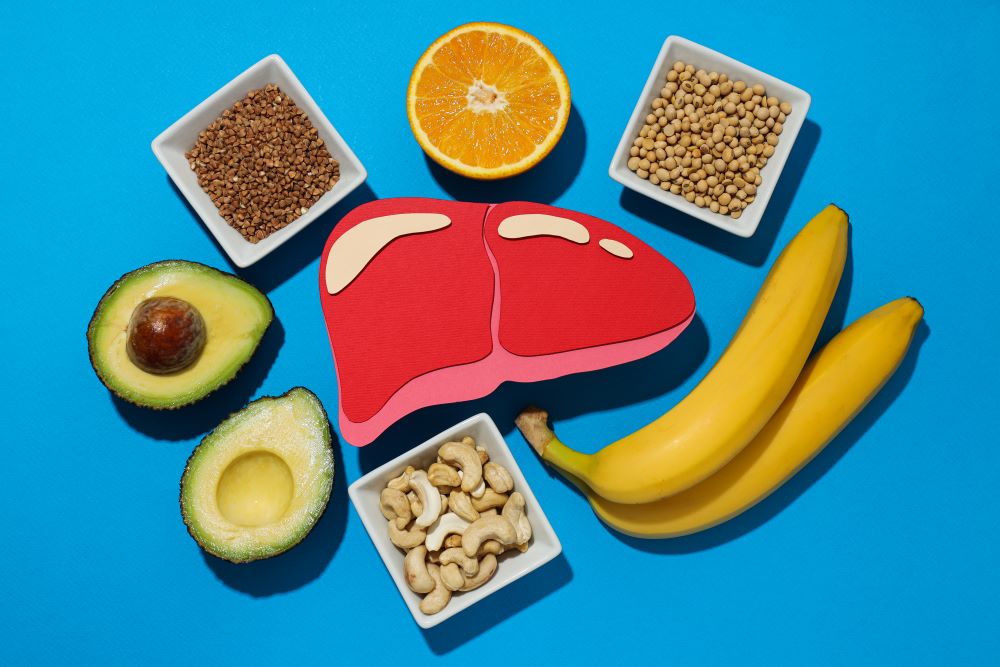What Vitamins & Supplements are Good for Liver Health?

Vitamins are necessary to help the liver perform its tasks, i.e., digestion, synthesising proteins, producing hormones, and filtering toxins present in diet and environment. Therefore, inadequate intake of essential vitamins can affect liver health and disrupt its functions.
Read on to know the essential vitamins for liver health and related information.

Table of Contents

Best Vitamins & Supplements for Liver Health
Vitamins that play a crucial role in maintaining liver health include vitamin D, E, C, B. Individuals need to take these vitamins regularly through a healthy diet plan.
Read along!
Best Sources of Essential Vitamins & Supplements for Liver Health

To maintain optimal liver health, it is crucial to include specific vitamins and supplements in your diet. The table below highlights the best sources of these essential nutrients and where you can find them.
Daily Intake of Vitamins & Supplements for Healthy Liver
Maintaining a healthy liver requires an adequate intake of essential vitamins and supplements. The table below provides the daily recommended limit for these vital nutrients to support liver health.
Role of Vitamins & Supplements for a Healthy Liver
Incorporating the right vitamins and supplements can significantly enhance liver health. Below are the key benefits of essential vitamins and supplements for maintaining optimal liver function.
How to Support Liver Health in Your Daily Routine?
Supporting liver health is crucial for overall well-being. Here are effective ways to maintain optimal liver function:
- Maintain a Healthy Diet: Consume a balanced diet and avoid excessive consumption of processed foods, saturated fats, and sugars, which strain the liver.
- Stay Hydrated: Drink plenty of water throughout the day to support liver function in filtering toxins and waste products from the bloodstream.
- Limit Alcohol Consumption: Alcohol can damage liver cells over time. Limit intake and adhere to recommended guidelines for moderate drinking or abstain altogether.
- Avoid Smoking and Limit Toxin Exposure: Minimise exposure to toxins and avoid smoking to reduce strain and burden on this vital organ.
- Exercise Regularly: Regular exercise improves circulation and promotes liver health. It also helps maintain a healthy weight and reduces the risk of liver disease.
- Manage Stress: Chronic stress can contribute to liver damage. Practice stress-reducing techniques to support liver function and overall health.
- Get Regular Check-ups: Schedule regular health check-ups to monitor liver enzymes and overall health. Early detection allows for timely treatment.
How to Boost Vitamin Levels for Liver Health?
Maintaining adequate vitamin levels is essential for supporting liver function and overall health. Here are several effective strategies to boost your vitamin intake specifically for liver health:
- Consume Vitamin-Rich Foods: Include a variety of fruits, vegetables, whole grains, and lean proteins in your diet. Foods high in vitamins B, C, D, and E are particularly beneficial for liver health.
- Take Vitamin Supplements: If you have difficulty getting enough vitamins from your diet alone, consider taking supplements. Consult with a healthcare professional to ensure you choose the right ones and take appropriate doses.
- Get Adequate Sun Exposure: Vitamin D is vital for liver health, and sunlight is one of the best sources. Aim for moderate sun exposure, or consume vitamin D-rich foods like fortified milk, cereals, and fatty fish to maintain healthy levels.
- Include B Vitamins in Your Diet: B vitamins are crucial for liver metabolism. Incorporate foods such as whole grains, legumes, nuts, and seeds into your meals to boost your intake of these essential nutrients.
- Limit Alcohol Intake: Excessive alcohol consumption can deplete your body's vitamins and minerals, which are essential for liver function. Reducing alcohol intake can help maintain healthy vitamin levels.
Vitamin Deficiency Diseases Linked to Poor Liver Health
- Around 90% of vitamin B12 is stored in the liver. When the liver health deteriorates, the stored Vitamin B12 level also decreases, leading to deficiency diseases. Inadequate vitamin B12 in the body can lead to anaemia, a medical condition in which an individual’s red blood cell count reaches below the standard level.
- Low serum vitamin D can cause non-alcoholic fatty liver disease.
- Also, vitamin D looks after the bone structure and condition. The deficiency of vitamin D can affect calcium absorption and lead to weaker bones. Additionally, chronic liver disease may develop another medical condition called osteoporosis, where bones weaken, making patients prone to bone fracture. Vitamin D inadequacy can degrade this situation even further.
- Insufficient vitamin E has been noticed mostly in patients with primary biliary Cirrhosis and other chronic cholestatic diseases.
- It has been noticed that liver diseases can cause B1, B6, and B12 deficiencies.
- Consequently, insufficient vitamin B1 can affect mental health and hamper certain functions such as memory and coordination.
- A low level of B6 can result in symptoms of tingling and numbness, which can arise from nerve damage.
Effects of Long-term Vitamin Deficiency on Liver
A study indicates that patients with Cirrhosis, a chronic liver disease, are significantly more prone to experiencing vitamin D deficiency, and the level decreases significantly in patients with alcoholic liver cirrhosis rather than primary biliary Cirrhosis. In liver cirrhosis, the damage caused by hepatitis, other viruses, and alcohol cannot be reversed.
Now that individuals know about the essential vitamins for liver health and repair, they can take care of their vital digestive organs.
Should You Take a Liver Health Supplement?
Deciding on liver health supplements requires careful consideration of lifestyle factors like diet, alcohol consumption, and toxin exposure. These supplements can benefit those with specific liver conditions but should complement, not replace, a healthy lifestyle.
Consult a healthcare provider before starting any supplement regimen. They can evaluate your health needs and recommend suitable supplements. Regular monitoring is essential to ensure effectiveness and make necessary adjustments. Making informed decisions involves understanding your health needs and choosing evidence-based, quality products.
Maintaining liver health is crucial for overall well-being. Incorporating specific vitamins and supplements can significantly promote liver function and prevent liver-related conditions. Prioritise a balanced diet, exercise, and a healthy lifestyle to support your liver’s resilience and vitality.













